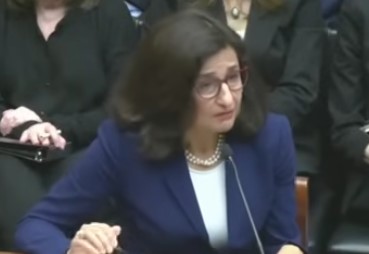Newsman: Minouche Shafik, the president of Columbia University in New York City, resigned on Wednesday after her handling of pro-Palestinian protests on campus earlier this year. Katrina Armstrong, the chief executive officer of Columbia University Irving Medical Center, has agreed to serve as the school’s interim president, according to a Wednesday night email from the board of trustees.
“We believe that Katrina is the right leader for this moment,” they wrote. “We are grateful to her for stepping in, and we call on our community to support her.”
House Speaker Mike Johnson released a statement late Wednesday, calling Shafik’s resignation “long overdue.”
“We hope that President Shafik’s resignation serves as an example to university administrators across the country that tolerating or protecting antisemites is unacceptable and will have consequences,” Johnson said in a statement. “Jewish students at Columbia beginning this school year should breathe a sigh of relief.”
President of Columbia University Shafik announced her resignation in a letter sent Wednesday.
“This period has taken a considerable toll on my family, as it has for others in our community,” she wrote in an email to students and faculty Wednesday evening. “Over the summer, I have been able to reflect and have decided that my moving on at this point would best enable Columbia to traverse the challenges ahead.”
Minouche Shafik wrote that she had time this summer to reflect and decided it would be best for Columbia if she moved on.
“Even as tension, division, and politicization have disrupted our campus over the last year, our core mission and values endure and will continue to guide us in meeting the challenges ahead,” Shafik’s letter said.
“I have had the honor and privilege to lead this incredible institution, and I believe that — working together — we have made progress in a number of important areas,” she wrote. “However, it has also been a period of turmoil where it has been difficult to overcome divergent views across our community. This period has taken a considerable toll on my family, as it has for others in our community.”
Minouche Shafik president of Columbia University added, “It has been distressing — for the community, for me as president and on a personal level — to find myself, colleagues, and students the subject of threats and abuse. As President Lincoln said, “A house divided against itself cannot stand” — we must do all we can to resist the forces of polarization in our community.”
As the spring semester neared a close, Shafik’s attempt to assuage bipartisan concerns about antisemitism only inflamed the situation at the school. Anti-Zionist protestors occupied the campus lawns in droves in the wake of her testimony, demanding the university sever all ties with the state of Israel. Shafik said the demonstrators were violating university policies and posing a “clear and present danger.” She called in the New York City Police Department, and officers arrested more than 100 protestors.
Later that month, when campus protestors took over an academic building, she called law enforcement back to campus. Days earlier she had indicated she had no plans to again call on the police to quell student dissent related to the conflict in the Middle East.
Minouche Shafik is the third Ivy League university president to leave her job following criticism over how she has handled campus protests regarding the Israel-Hamas war. She served this position for 13 months.

